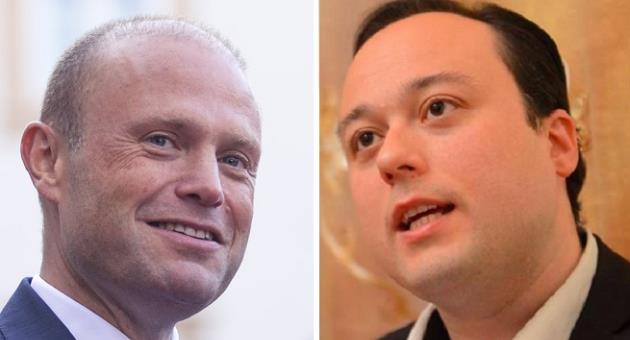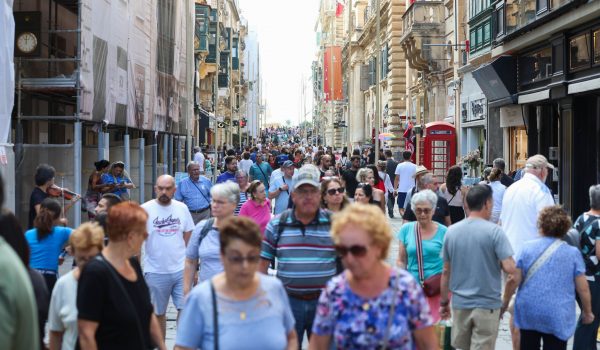
Despite Malta’s high vaccination rates and exceptionally high efficacy, “less than half of respondents (to a survey) believe that their life will return to a pre-Covid-19 normal,” an economic note has read
This economic note summarises the main findings of a telephone-based, scientific survey conducted by Vincent Marmara and Sagralytics during June 2021 and is supplemented by an economic analysis carried out by what has been described as The Office of Dr Joseph Muscat, the former prime minister.
The results show that some elements that occurred during the pandemic, such as the shift to online shopping, are here to stay as respondents indicated “the intention to keep using this method for all services considered in this study.”
This study has uncovered that the fast roll-out of the vaccination programme has contributed significantly in boosting consumer confidence and also consumption levels, the document read. “This is shown by the fact that actual consumption of services, especially restaurants, has climbed considerably from the levels seen in summer of last year. Projected consumption levels after vaccination show a very stark distinction in consumption levels relative to their pre-Covid-19 levels. Consumption of services such as restaurants and coffee shops is set to return to levels which are very close to, albeit still lower than, pre-pandemic levels. On the other hand, significantly less robust improvements are predicted for the travel industry and the use of public transport.”
“Moreover, when these figures are compared with previous forecasts of post-Covid-19 consumption levels, we only see marginal improvements relative to our projections of May and September 2020. Thus, while the vaccine roll-out has certainly improved consumer confidence and boosted consumption at the current juncture, the extent of the upward revisions in post-Covid-19 forecasts is low particularly for hotel breaks, holidays abroad and the use of public transportation.”
The results have two important policy implications, the report read. “First, they point to an important element of long-run scarring left by the pandemic, which is best displayed in the long-run drops in consumption levels across all population categories, and that are predicted to persist even after the current vaccination programme is complete. While the policies enacted up till now by Government were quite successful in propping up consumption in the short-run, new policies are required that are aimed at effectively tackling the underlying issues which are at the heart of the long-run drops in economic activity being predicted.”
Improved economic outlook but still below pre-Covid-19 levels
Respondents indicated that once they are vaccinated against Covid-19, they intend to significantly boost the consumption of all activities, the report read. The strongest revisions are projected to occur in consumption of restaurants and coffee shops services, where consumption levels after vaccination are expected to return very close to pre-pandemic levels. Significant improvements in consumption are also envisaged in the retail sector and in internal tourism, it read.
“After vaccination, expenditure in clothes, footwear, and other retail establishments as well as hotel and farmhouse breaks are expected to reach around 85%-90% of the pre-Covid-19 levels. Less robust improvements are seen in services that require transportation. Mirroring previously discussed results, even after vaccination, the frequency of going on holidays abroad is expected to remain less than 70% of the pre-Covid-19 levels,” it read.
“Similar results are seen in the use of public transportation which almost does not record any improvements due to vaccination. The latter result has important ramifications, especially with regards to the national traffic management and on managing Malta’s carbon footprint. If the drop in the use of public transportation is accompanied by a rise in the use of private transportation, one can easily project a worsening of traffic congestion and air pollution issues especially if all employees start to work from office as Covid-19 mitigation measures are slowly lifted. Alternatively, more incentives to use public transport, including the option to make it free of charge for residents, should be actively pursued.”
“All in all, despite the significant pick-up in economic activity that is seen after the vaccination of the whole population, respondents have indicated that on average they still expect to consume less than they did before the Covid-19 pandemic started.”
The report reads that the start of the vaccination programme has led to an increase in the consumption of all services under consideration. “On the other hand, the expectation of a complete return to normality is dampening, with a significant proportion of the population who are either unsure of whether we will ever return to a normal way of living or are outright certain that they will never fully regain their previous life.”
The study showed that government vouchers are especially successful in boosting consumption in Malta by temporarily increasing liquidity of households and by boosting consumer confidence in the safety of the establishments that were most hit by the crisis. “However, such policies are by their very design temporary in nature as they are specifically designed to address drops in consumption only in the short-run. On the other hand, the long-run falls in consumptions predicted in all surveys conducted up till now point to underlying issues which are of a more long-run nature. These issues might stem from either medical or economic uncertainty.”
It read that the repeated observations of new Covid-19 variants together with the uncertainty surrounding the efficacy of vaccines in preventing infections in the long-run might be weighing down on respondents’ expectations about the future. The report reads that one needs to identify and better study the underlying issues behind the drops in long-run consumption and formulate adequate policy responses, “which might be different depending on whether the causes are of a behavioural, medical, or financial nature.”
The Note also deals with the reluctance of Maltese to make use of public transport.
“If the long-run drop in public transport use materialises, gains in efficiency made through unprecedented investments in road infrastructure to alleviate traffic congestion might be redimensioned given a probable shift towards less collective means of transport. Moreover, the increased use of public transportation is usually a very effective way to reduce carbon emissions derived from transportation as these are typically much more efficient ways of transportation than non-collective means.”
“A drop in the permanent use of public transport, especially if not accompanied by a shift towards a more wide-spread use of home working solutions that might somehow reduce demand for transportation, would have serious implications on the carbon footprint of the Maltese economy. Alternatively, more incentives to use public transport, including the option to make it free of charge for residents, should be actively pursued.”
Source: independent.com.mt



